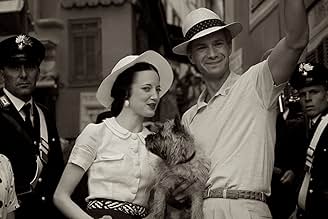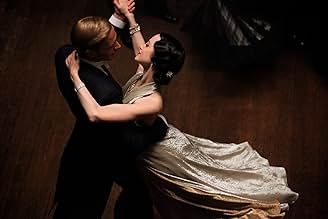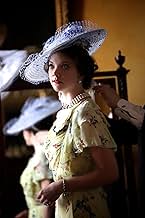VALUTAZIONE IMDb
6,2/10
13.937
LA TUA VALUTAZIONE
La relazione tra il re Edoardo VIII e la divorziata americana Wallis Simpson e una storia d'amore contemporanea tra una donna sposata e una guardia di sicurezza russa.La relazione tra il re Edoardo VIII e la divorziata americana Wallis Simpson e una storia d'amore contemporanea tra una donna sposata e una guardia di sicurezza russa.La relazione tra il re Edoardo VIII e la divorziata americana Wallis Simpson e una storia d'amore contemporanea tra una donna sposata e una guardia di sicurezza russa.
- Candidato a 1 Oscar
- 4 vittorie e 6 candidature totali
Recensioni in evidenza
W.E. (2011)
Don't even think about who directed this. Think of it as a multi-layered, multi-era epic centering on the marriage of King Edward and his American love, Wallis Simpson. He's the English king who abdicated for love. But this is the story of the love, Wallis, the woman who gave up as much as the king did, or so the thrust of the movie suggests.
It's rather good! It mixes a bit of fantasizing with a contemporary woman, Wally, finding her obsession with the Wallis of history (1930s) is more than coincidence. The narrative flips between several parts of the royal story before WWII and the contemporary version, which includes a budding relationship with a guard at an exhibition of Wallis Simpson memorabilia.
Whether you find either story convincing doesn't matter. One of them is of course based on history, and is interesting if you don't already know the facts. The other is an echo of the same, with the woman having to become strong and independent just as her earlier namesake did.
What is most interesting is the way the two stories are inter-spliced, including some scenes where the two times zones are mixed (apparently in Wally's head, but it's very real to the audience). We start to see how often and completely women are stuck in situations they would not choose if they knew ahead of time. It's about independence, yes, but also failure to be independent and the consequences. And maybe it's about learning a little from history.
The director? Madonna. Yes, the singer from Michigan. The director of the terrible bomb "Filth and Wisdom." Here there is some real cinematic intelligence. It's a good movie. Flawed, a bit longer than it needs to be, a bit forced in the layering of stories, but well acted and conceived.
Don't even think about who directed this. Think of it as a multi-layered, multi-era epic centering on the marriage of King Edward and his American love, Wallis Simpson. He's the English king who abdicated for love. But this is the story of the love, Wallis, the woman who gave up as much as the king did, or so the thrust of the movie suggests.
It's rather good! It mixes a bit of fantasizing with a contemporary woman, Wally, finding her obsession with the Wallis of history (1930s) is more than coincidence. The narrative flips between several parts of the royal story before WWII and the contemporary version, which includes a budding relationship with a guard at an exhibition of Wallis Simpson memorabilia.
Whether you find either story convincing doesn't matter. One of them is of course based on history, and is interesting if you don't already know the facts. The other is an echo of the same, with the woman having to become strong and independent just as her earlier namesake did.
What is most interesting is the way the two stories are inter-spliced, including some scenes where the two times zones are mixed (apparently in Wally's head, but it's very real to the audience). We start to see how often and completely women are stuck in situations they would not choose if they knew ahead of time. It's about independence, yes, but also failure to be independent and the consequences. And maybe it's about learning a little from history.
The director? Madonna. Yes, the singer from Michigan. The director of the terrible bomb "Filth and Wisdom." Here there is some real cinematic intelligence. It's a good movie. Flawed, a bit longer than it needs to be, a bit forced in the layering of stories, but well acted and conceived.
The cross-cutting between 2 timelines and locations for no apparent reason was not only confusing, it was also annoying. By the time we got into the story proper, I was so ticked off I didn't care about any of the characters, quite apart from the fact that I couldn't work out what was going on. This is definitely one of those "look-at-my-filmmaking-skillz" types of films, which makes it so hard to watch and enjoy. This is the first film by Madonna I have watched and will almost certainly be my last.
Far from the best or worst picture of the year, W.E. is certainly the most intriguing. It tells the story of Wallis Simpson (Andrea Riseborough) and the New York housewife who is obsessed with her in 1998 (played by Abbie Cornish). This is not a straightforward historical film, nor is it trying to be. Instead, the film is a mediation on celebrity, history and the way people search in those realms for meaning in their own lives. For example, Wally in 1998 is trapped in a loveless marriage where she is virtually ignored by everyone, so she imagines Wallis as utterly fabulous, and adored by the man who abdicated for her. "What are you thinking about?" she is asked at one point. She responds, "What it must feel like to be loved that much". Madonna hits that nail right on its head, and this premise is the reason she can't tell the story from a straight historical perspective--celebrities really only exist in our heads. Madonna likely knows this better than anyone. For this reason, Wally waves away her idols alleged Nazi sympathies and the possibility that she and Edward's marriage was not all that it seemed, because in New York in 1998, she needs to believe that love can be eternal. In this context, the much maligned scenes in which Wallis appears to Wally to give advice make perfect sense. All celebrities and historical figures really are figments of our imaginations anyway.
In the end, the theme is that people should not obsess over celebrities, but should "get a life" of their own. This brings us to the films one serious downfall. The audience is forced to spend more than half the movie with Wally, who is beyond boring and unsympathetic. This can be blamed on the script and the performance by Abbie Cornish, who never seems to do any more than pose and read lines. The character was never believable or engaging, and the script must resort to over the top melodrama to move her story along. In short, the 1998 storyline is a mess, and you'd think that a film whose premise is that celebrity-obsessed people need to get a life would have known better than to focus on an obsessed fan with no life.
That said, everything with Wallis is spot on, better even than anything found in "The King's Speech" (2010). Andrea Riseborough, who plays Wallis accomplishes in a single scene what Abbie Cornish couldn't in all of the movie. She makes us admire and care for the woman she's playing. She has a charisma (much like the director herself) that guarantees the indulgence of the audience. She is going to be naughty, and we're going to love her for it.
And thus you have the most interesting movie of the year: half masterpiece, half slog. If the 1931 storyline had been stretched out to 90 minutes, and the 1998 one reduced to 10 or 15, this would have been one of the best films of the year. As it is, it a tremendous curiosity.
I must mention, however, the best scene in the movie, featuring an elderly Wallis and a dying Edward. I shan't give it away except to say that it captures perfectly both the sweetness of enduring love and the sadness, and inevitability of age and death. Where I was laughing derisively at the previous scene, this one had me in tears before it was through. Like I said, a very interesting experience.
I have refrained from mentioning its superstar director, because most critics can't seem to see past their feelings about her as a person. Still, I can't help but note that Madonna is vastly better suited to depict the lifestyles of the rich and fabulous, than the dreary doldrums of us common-folk.
In the end, the theme is that people should not obsess over celebrities, but should "get a life" of their own. This brings us to the films one serious downfall. The audience is forced to spend more than half the movie with Wally, who is beyond boring and unsympathetic. This can be blamed on the script and the performance by Abbie Cornish, who never seems to do any more than pose and read lines. The character was never believable or engaging, and the script must resort to over the top melodrama to move her story along. In short, the 1998 storyline is a mess, and you'd think that a film whose premise is that celebrity-obsessed people need to get a life would have known better than to focus on an obsessed fan with no life.
That said, everything with Wallis is spot on, better even than anything found in "The King's Speech" (2010). Andrea Riseborough, who plays Wallis accomplishes in a single scene what Abbie Cornish couldn't in all of the movie. She makes us admire and care for the woman she's playing. She has a charisma (much like the director herself) that guarantees the indulgence of the audience. She is going to be naughty, and we're going to love her for it.
And thus you have the most interesting movie of the year: half masterpiece, half slog. If the 1931 storyline had been stretched out to 90 minutes, and the 1998 one reduced to 10 or 15, this would have been one of the best films of the year. As it is, it a tremendous curiosity.
I must mention, however, the best scene in the movie, featuring an elderly Wallis and a dying Edward. I shan't give it away except to say that it captures perfectly both the sweetness of enduring love and the sadness, and inevitability of age and death. Where I was laughing derisively at the previous scene, this one had me in tears before it was through. Like I said, a very interesting experience.
I have refrained from mentioning its superstar director, because most critics can't seem to see past their feelings about her as a person. Still, I can't help but note that Madonna is vastly better suited to depict the lifestyles of the rich and fabulous, than the dreary doldrums of us common-folk.
"W.E." had one hell of an uphill battle. Not only is it a period piece, but the film is also written and directed by the one woman in the world that makes people pass judgement before even experiencing her work. That woman is Madonna.
The film tells the tale of the infamously scandalous affair of King Edward VIII (aka David) and Wallis Simpson for whom, in the 1930s, he gave up everything for, even abdicating the throne of England. Being a twice-divorced American, Wallis Simpson was a woman the monarchy would never accept, and because of that, David left everything behind for love. The film concurrently takes us back to 1998 and Wally Winsthrop, a woman who was named after Ms. Simpson by her Wallis-obsessed mother and who also finds herself in a marriage that is not living up to the magic she expected it to be, a fact which is brought more to life by the flirtations of a Russian security guard she encounters at an auction of the Windsor Estate at Sotheby's.
I can honestly say that, despite being an enormous fan of most of Madonna's artistic endeavours, I was not sure how this film would play out. But you know what? It's a good film. First of all, it takes the perspective of Wallis Simpson in telling the first story, which goes against the norm. Secondly, the interweaving of the two completely different time periods is extremely well done, incredibly edited, and manages to keeps you invested in both stories equally. And most surprisingly, it was an entertaining history lesson: Not only do you learn of this hugely publicized affair but the film, in a way, is almost like a prequel to last year's powerhouse, "The King's Speech," as that film focuses on Bertie, David's brother, who had to take over the throne once David renounced it.
The film is not perfect, but as Madonna's second attempt at directing, you have to give her credit. Something many critics just refuse to do. No, the script is far from genius, but it's far from awful. The film is visually beautiful to watch and the integration of regular filming and documentary-style graininess makes for an interesting watch. Then there is the exquisite costumes for which this film is nominated for an Academy Award...and has a good chance at winning. And the performances, all of which are good. Andrea Risborough ("Made in Dagenham," "Happy Go Lucky") gives a strong turn, if not slightly off kilter at times, as Wallis Simpson. James D'Arcy is at times whimsical yet stoic as the terribly handsome King Edward. Abbie Cornish ("Limitless") is close to heartbreaking as the suffering Wally Winthrop and Richard Coyle ("Prince of Persia") gives a great performance as Wally's emotionally absent husband. And then there is Oscar Isaac, also in the Oscar-nominated "Drive," as the incredibly handsome and sweet Russian who perks up each time Wally is around.
No, "W.E." is not brilliant, but it's far better than you might expect, Madonna proving to be a far better director than anyone might give her credit for. And if you just love her for her music, the Golden-Globe winning "Masterpiece" plays along the closing credits. Although I have always preferred her musical endeavours over her cinematic attempts, this attempt is one she can definitely be proud of.
The film tells the tale of the infamously scandalous affair of King Edward VIII (aka David) and Wallis Simpson for whom, in the 1930s, he gave up everything for, even abdicating the throne of England. Being a twice-divorced American, Wallis Simpson was a woman the monarchy would never accept, and because of that, David left everything behind for love. The film concurrently takes us back to 1998 and Wally Winsthrop, a woman who was named after Ms. Simpson by her Wallis-obsessed mother and who also finds herself in a marriage that is not living up to the magic she expected it to be, a fact which is brought more to life by the flirtations of a Russian security guard she encounters at an auction of the Windsor Estate at Sotheby's.
I can honestly say that, despite being an enormous fan of most of Madonna's artistic endeavours, I was not sure how this film would play out. But you know what? It's a good film. First of all, it takes the perspective of Wallis Simpson in telling the first story, which goes against the norm. Secondly, the interweaving of the two completely different time periods is extremely well done, incredibly edited, and manages to keeps you invested in both stories equally. And most surprisingly, it was an entertaining history lesson: Not only do you learn of this hugely publicized affair but the film, in a way, is almost like a prequel to last year's powerhouse, "The King's Speech," as that film focuses on Bertie, David's brother, who had to take over the throne once David renounced it.
The film is not perfect, but as Madonna's second attempt at directing, you have to give her credit. Something many critics just refuse to do. No, the script is far from genius, but it's far from awful. The film is visually beautiful to watch and the integration of regular filming and documentary-style graininess makes for an interesting watch. Then there is the exquisite costumes for which this film is nominated for an Academy Award...and has a good chance at winning. And the performances, all of which are good. Andrea Risborough ("Made in Dagenham," "Happy Go Lucky") gives a strong turn, if not slightly off kilter at times, as Wallis Simpson. James D'Arcy is at times whimsical yet stoic as the terribly handsome King Edward. Abbie Cornish ("Limitless") is close to heartbreaking as the suffering Wally Winthrop and Richard Coyle ("Prince of Persia") gives a great performance as Wally's emotionally absent husband. And then there is Oscar Isaac, also in the Oscar-nominated "Drive," as the incredibly handsome and sweet Russian who perks up each time Wally is around.
No, "W.E." is not brilliant, but it's far better than you might expect, Madonna proving to be a far better director than anyone might give her credit for. And if you just love her for her music, the Golden-Globe winning "Masterpiece" plays along the closing credits. Although I have always preferred her musical endeavours over her cinematic attempts, this attempt is one she can definitely be proud of.
Having finally opened in the UK, I've now had the opportunity to watch 'W.E.', having followed its coverage to this point with interest. I can't, in all honestly, say that this is a good movie. I'll back the common positives and reiterate that it looks amazing and Andrea Riseborough is wonderful in it. The score, while lovely, is over- powering at times - Madonna is obviously terrified of silence!
I went with the movie quite happily for the first hour. The Wallis and Edward scenes are effective (I thought the dizzying/choppy camera work worked really well contrasting with the vintage images) and reminded me quite a bit of Stephen Fry's movie "Bright Young Things". But they had absolutely zero dramatic tension. Largely, this was due to the fact that they weren't chronological, but also it was because (to my horror) they almost seemed there to serve the modern day story, rather than vice versa.
And as for those modern day parts ... well ... Firstly, I'll say that I didn't think the concept was bad and it had potential. However, they needed to be trimmed by about three quarters. Christ, did they ever go on. The dialogue was serviceable, at best, and toe-curling at worst. The character of Wally was about as engaging as a paper clip and that was largely due to Abby Cornish's lifeless performance. Honestly, I wanted to scream at the screen, "Stop whispering all the time and TALK, woman!" That said, if the movie had only cut to these scenes every so often and used them as well-timed interjections, rather than as a story worthy of screen time in their own right, it would have been more bearable.
The film really lost me in the second hour when I realised it had used up all its party tricks and it was obvious where it was going. (And, no, I don't mean the Wallis/Edward story arch, but how it was going to contrast the two tales, and what the oh-so-obvious climax was going to be.) By the end, I couldn't wait for it to finish.
There are some lovely scenes, though, and several nice touches throughout. But while the infamous 'Pretty Vacant' sequence is probably trying to say profound things about Wallis having a punk spirit, it feels rather out of place. (It's fun, though, I'll give it that.)
So, really, it's nowhere near the one star disaster many are claiming. And I, genuinely, can't see why anyone could charge it would be, other than to appear 'cool' to knock Madge. It's got too much going for it, for that.
But the reason I said 'semi-noble failure' is because, while I think it had some ambition, it's indulgent to a fault. At least twenty minutes of this movie are taken up by Abby Cornish wandering around Sothebys, exchanging in vacant platitudes with the Russian security guard, or looking blandly at something we're told should be exciting by the volume of the score. And, I guess, the blame for including such non-interesting stuff must lie with the movie's director.
I went with the movie quite happily for the first hour. The Wallis and Edward scenes are effective (I thought the dizzying/choppy camera work worked really well contrasting with the vintage images) and reminded me quite a bit of Stephen Fry's movie "Bright Young Things". But they had absolutely zero dramatic tension. Largely, this was due to the fact that they weren't chronological, but also it was because (to my horror) they almost seemed there to serve the modern day story, rather than vice versa.
And as for those modern day parts ... well ... Firstly, I'll say that I didn't think the concept was bad and it had potential. However, they needed to be trimmed by about three quarters. Christ, did they ever go on. The dialogue was serviceable, at best, and toe-curling at worst. The character of Wally was about as engaging as a paper clip and that was largely due to Abby Cornish's lifeless performance. Honestly, I wanted to scream at the screen, "Stop whispering all the time and TALK, woman!" That said, if the movie had only cut to these scenes every so often and used them as well-timed interjections, rather than as a story worthy of screen time in their own right, it would have been more bearable.
The film really lost me in the second hour when I realised it had used up all its party tricks and it was obvious where it was going. (And, no, I don't mean the Wallis/Edward story arch, but how it was going to contrast the two tales, and what the oh-so-obvious climax was going to be.) By the end, I couldn't wait for it to finish.
There are some lovely scenes, though, and several nice touches throughout. But while the infamous 'Pretty Vacant' sequence is probably trying to say profound things about Wallis having a punk spirit, it feels rather out of place. (It's fun, though, I'll give it that.)
So, really, it's nowhere near the one star disaster many are claiming. And I, genuinely, can't see why anyone could charge it would be, other than to appear 'cool' to knock Madge. It's got too much going for it, for that.
But the reason I said 'semi-noble failure' is because, while I think it had some ambition, it's indulgent to a fault. At least twenty minutes of this movie are taken up by Abby Cornish wandering around Sothebys, exchanging in vacant platitudes with the Russian security guard, or looking blandly at something we're told should be exciting by the volume of the score. And, I guess, the blame for including such non-interesting stuff must lie with the movie's director.
Lo sapevi?
- QuizFashion house Christian Dior recreated three dresses for this film that it had previously made for the real Wallis Simpson.
- BlooperIn the newsreel scene from 1936 showing the funeral procession of Edward's father the King, the voiceover announcer says that "King George the Third has died and the nation mourns". It should of course have been King George the Fifth.
- Citazioni
Wallis Simpson: Darling, they can't hurt you if you don't let them.
- ConnessioniFeatured in Breakfast: Episodio datato 3 settembre 2011 (2011)
- Colonne sonoreKarin
Written by Christoph Clöser, Morten Gass
Performed by Bohren & Der Club of Gore
Published by Manuskript © (P) Bohren & Der Club of Gore released under exclusive license by [Pias] Recordings 2008
I più visti
Accedi per valutare e creare un elenco di titoli salvati per ottenere consigli personalizzati
- How long is W.E.?Powered by Alexa
Dettagli
- Data di uscita
- Paesi di origine
- Siti ufficiali
- Lingue
- Celebre anche come
- W.E.
- Luoghi delle riprese
- Aziende produttrici
- Vedi altri crediti dell’azienda su IMDbPro
Botteghino
- Budget
- 15.000.000 USD (previsto)
- Lordo Stati Uniti e Canada
- 583.455 USD
- Fine settimana di apertura Stati Uniti e Canada
- 47.074 USD
- 5 feb 2012
- Lordo in tutto il mondo
- 2.042.203 USD
- Tempo di esecuzione1 ora 59 minuti
- Colore
- Mix di suoni
- Proporzioni
- 2.35 : 1
Contribuisci a questa pagina
Suggerisci una modifica o aggiungi i contenuti mancanti

Divario superiore
What was the official certification given to W.E. - Edward e Wallis (2011) in Germany?
Rispondi









































